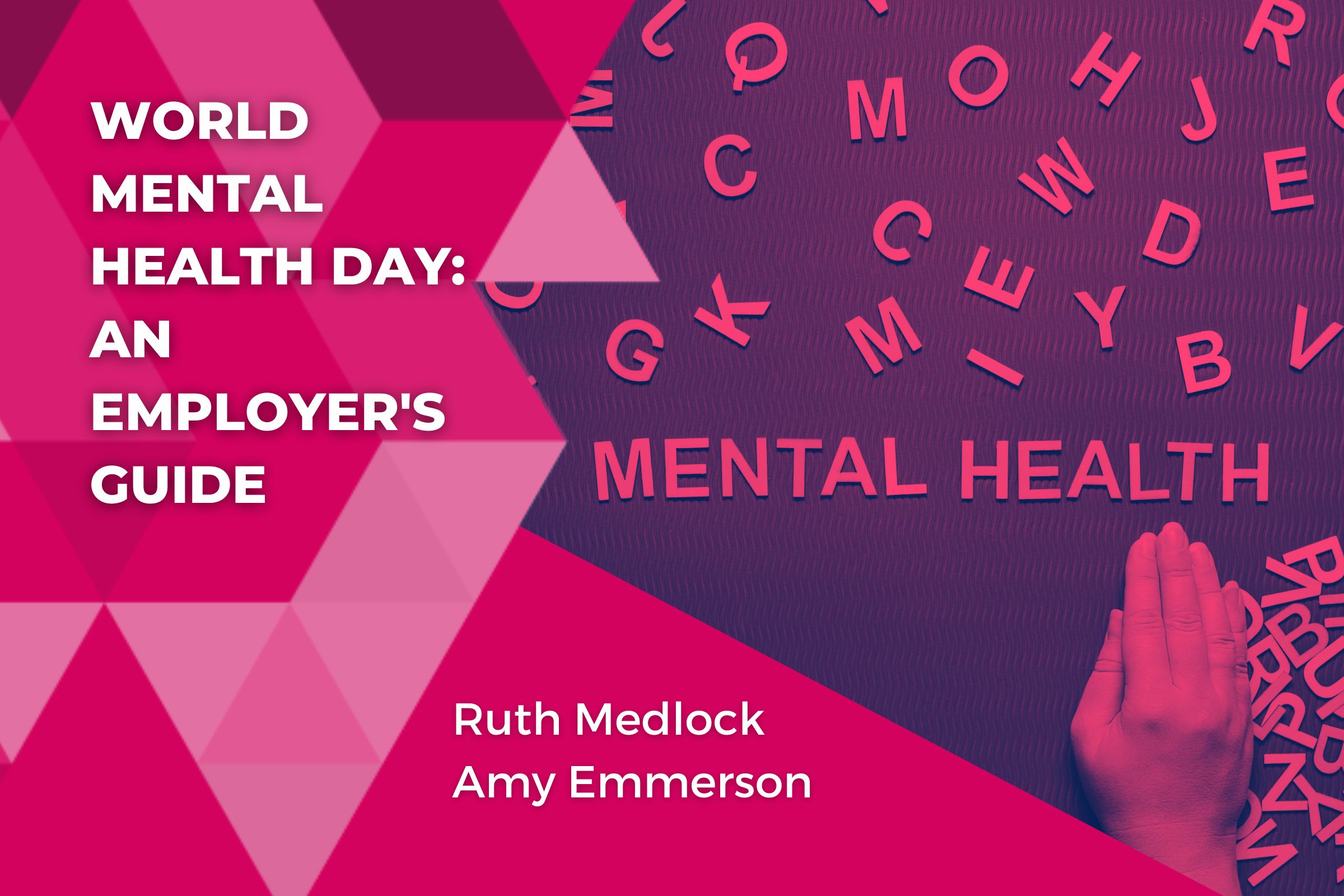
World Mental Health Day is held on 10 October every year, with this year’s theme being ‘mental health is a universal human right’. The aim is to raise awareness and drive actions that promote and protect mental health as an essential human right.
How does the workplace affect mental health?
For many of us, work is a significant part of our lives. Whilst stress itself is not classed as a medical condition, work-related stress can still be serious and cause, or make worse, other mental health conditions. Such stress may be caused by factors such as unmanageable deadlines or an unhealthy work-life balance.
Employers have a duty of care and are responsible for doing all they can reasonably do to support their employees’ health, safety and wellbeing. Under the Equality Act (2010), ongoing mental health problems can meet the definition of disability, which protects employees from discrimination and allows for reasonable adjustments to be made to adapt their job or work if required. Accordingly, it is important for you to implement relevant policies and procedures which offer support and protection to your employees’ mental wellbeing.
What can you do to support employees with their mental health?
Practicing good management is key to encouraging employee mental wellbeing. This may be achieved via ensuring job roles are well defined with clear and achievable objectives, investigating and appropriately addressing any complaints, ensuring employees are able to and do use break and holiday entitlements and are not working excessive hours. There is strong evidence to suggest that workplaces with high levels of mental wellbeing are more productive. Studies have shown that addressing wellbeing at work can increase productivity by as much as 12%.[1]
Below are some ideas to assist with promoting mental wellbeing in the workplace:
- Commitment to mental health policy: consult and communicate with employees to implement a policy designed to protect mental health. This should include the policy’s aims, strategies to address any problems, the roles and responsibilities of staff in implementing the policy and how the policy will be monitored and reviewed;
- Develop good relationships: it is important for healthy relationships within the organisation to be encouraged, for example through utilising appropriate policies and procedures to deal with violence, bullying or harassment, ensuring teams are designed with the appropriate level of experience and opportunities are available for social activities;
- Encourage communication: communication should be encouraged across all levels of the organisation. By encouraging an ‘open door’ policy, employees are encouraged to talk to their colleagues and raise any concerns with management if required;
- Support and training: offer opportunities within the workplace to improve employees’ mental health and understanding of such by providing mental health awareness training, support and/or access to counselling;
- Flexible and/or hybrid working: by allowing for flexible and/or hybrid working arrangements, employees are often able to create a better work-life balance. Flexible working provides employees with the tools to manage their work schedule around other commitments such as appointments and caring responsibilities. Potential financial stress regarding commuting can also be reduced.
At Miller Samuel Hill Brown, we recognise the importance of positive mental health and wellbeing in the workplace, and our commitment to promoting the issue reflects our dedication to creating an inclusive and supportive work environment for our staff. Our Employment Solicitor, Ruth Medlock, completed the Scottish Mental Health First Aid Training offered by the Law Society of Scotland to support the firm as our Mental Health First Aider. With the necessary skills and knowledge, Ruth can provide the necessary support and guidance to our colleagues, ensuring that they receive the help they need when they need it.
As we observe World Mental Health Day, we wish to reaffirm our commitment to promoting positive mental health and wellbeing in the workplace. We pledge to continue providing the necessary support and resources not only to our staff but to our clients to ensure their mental health and wellbeing. We are pleased to announce the launch of our new flexible retainer program, FLEX, which offers a range of benefits, including the drafting and reviewing of policies and procedures related to mental health and wellbeing in the workplace. More information about the full range of services available on FLEX is available here.
Ensuring that suitable protections are in place to safeguard employees’ mental health has numerous benefits, including better staff retention, reduced staff absences, strengthened capacity of the organisation and enhanced reputation as an employer. Our employment team have vast experience in assisting employers with creating policies in relation to family life and agile working. We invite you to call us now on 0141 221 1919 to discuss how our FLEX offering provides you with total control and ensures you get the right advice at the right time.
Our team is dedicated to working closely with you to gain a thorough understanding of your business, its unique needs, and desires. We strive to provide tailored solutions that work and truly make a difference for you, your employees, and ultimately your business. Our goal is to become the firm that you trust to make your world better.
[1] Oswald, A.J., Proto, E., & Sgroi, D. (2015). Happiness and Productivity. Journal of Labor Economics, 33 (4), 789- 822. doi: 10.1086/681096














